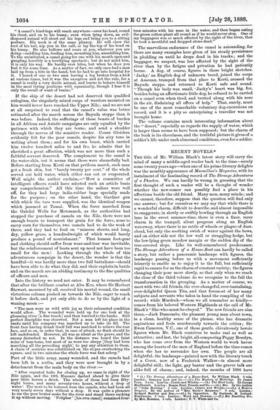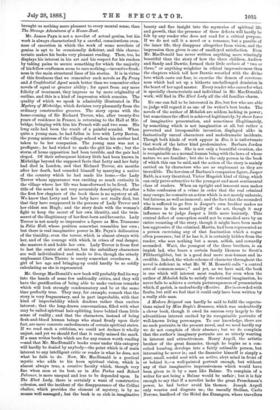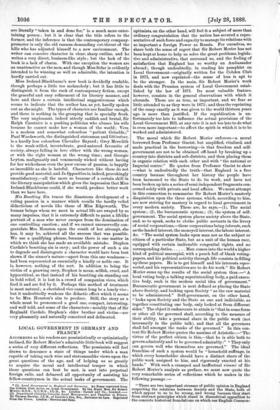RECENT NOVELS.*
THE title of Mr. William Black's latest story will carry the mind of many a middle-aged reader back to the time—surely some twenty years ago—when one of his prime literary delights was the monthly appearance of Macmillan's Magazine, with its instalment of the fascinating record of The Strange Adventures of a Phaeton. We can hardly be wrong in guessing that the first thought of such a reader will be a thought of wonder whether the new-coiner can possibly find a place in his affections beside the old friend. Many men, many minds; and we cannot, therefore, suppose that the question will find only one answer; but for ourselves we may say that while there is a wonderful charm, difficult to describe, and almost impossible to exaggerate, in slowly or swiftly bowling through an English lane in the sweet summer-time, there is even a finer, rarer charm in the tranquil, silent progress along an English waterway, where there is no rattle of wheels or plague of dust- cloud, but only the soothing swish of water against the bows, and on either side not the low wall or straggling hedge, but the low-lying green meadow margin or the sudden dip of the tree-covered slope. Like its well-remembered predecessor, The Strange Adventures of a House-Boat can hardly be called a story, but rather a panoramic landscape with figures, the landscape passing before us with a movement sufficiently leisurely to enable us to enjoy it to the full, but sufficiently rapid to ensure for us the charm of constant variety; the figures changing their pose more slowly, so that only when we reach the close of the third volume do we recognise to the full the transformation in the grouping. As a matter of course, we meet with two old friends, the ever-changeful, ever-tantalising, ever-delightful Queen Tita, and that foremost of her many subjects and servants who takes in hand the compiling of the record ; while Murdoch—whom we all remember so kindly— comes from his beloved Western Highlands at the call of Mr. Black's " She-who-must-be-obeyed." The new friends are also three,—Jack Duncombe, the pleasant young man about town, in a clean, healthy sense of the phrase, who has dramatic aspirations and feels murderously towards the Critics ; Sir Ewen Cameron, V.C., one of those gentle, chivalrously heroic figures whom Mr. Black contrives to make real as well as attractive ; and last, the bright, all-conquering Peggy Roselyn, who has come over from the Western world to work havoc among the hearts of the men of England before the time comes when she has to surrender her own. The people are all delightful, the landscape—painted now with the literary touch of a Corot, now of a Frederick Walker—is almost more delightful still; the light, gay banter and the graver talk are alike full of charm ; and, indeed, the months of 1888 have • (1.) The Strange Adventures of a House-Boat. By William Black. 3 vole. London : Sampson Low and Co.—(2.) The Mystery of Mirbridgo. By James Pays. 3 vole. London : Chatto and Windt:B.-13J The Meet Lady. By George MacDonald. London: Began Paul, Trench, and Co.—(4.) Eve. By the Author of "John Herring." 2 vols. London Chatto and Winclus.—(5.) A Modern Brigand. By the Author of "Misv Bayle's Romance." 3 vols. London: Richard Bentley and Son.—(6.) In Opposition. By Gertrude M. Ireland- Blackbarne. 3 vole. London : Ward and Downey.—(7.) His Besetting Sin. By Hrs. Houston. 3 vole. London : F. V. White and Co.
brought us nothing more pleasant to every mental sense, than The Strange Adventures of a House-Boat.
Mr. James Payn is not a novelist of actual genius, but his work is always characterised by a careful, conscientious even- ness of execution in which . the work of some novelists of genius is apt to be occasionally deficient, and this charac- teristic makes his books very pleasant reading. Then, too, he displays his interest in his art and his respect for his readers by taking pains to secure something for which the majority of his fellow-craftsmen seem to care nothing,—inventive fresh- ness in the main structural lines of his stories. It is in virtue of this freshness that we remember such novels as By Proxy and A Confidential Agent much better than we remember other novels of equal or greater ability ; for apart from any mere felicity of treatment, they impress us by mere originality of outline, and this is a kind of impression which remains. The quality of which we speak is admirably illustrated in The Mystery of Mirbridge, which deviates very pleasantly from the ordinary constructive grooves. The story opens with the home-coming of Sir Richard Trevor, who, after twenty-five years of residence in France, is returning to the Hall at Mir- bridge, bringing with him his French wife and two sons. His long exile had been the result of a painful scandal. When quite a young man, he had fallen in love with Letty Beeton, the young mistress of the village school whom his mother had taken to be her companion. The young man was not a profligate ; he had wished to make the girl his wife ; but the storm of home opposition had been terrible, and the pair had eloped. Of their subsequent history little had been known in Mirbridge beyond the supposed facts that Letty and her baby had died in London, and that Richard Trevor, six months after her death, had consoled himself by marrying a native of the country which he had made his home,—the Lady Trevor whose appearance was exciting so much curiosity in the village where her life was henceforward to be lived. The title of the novel is not very accurately descriptive, for after the first few chapters of the book there is no mystery at all. We know that Letty and her baby have not really died, but that they have reappeared in the persons of Lady Trevor and her eldest son Hugh ; and the story deals with the woman's fight to keep the secret of her own identity, and the twin- secret of the illegitimacy of her first-born and favourite. Lady Trevor is not nearly so impressive a figure as Mrs. Transome in Felix Holt, whose position somewhat resembles her own ; but there is real imaginative power in Mr. Payn's delineation of the timidity, even the terror, which is almost always with her, and of the courage with which, in crises of real danger, she masters it and holds her own. Lady Trevor is from first to last the centre of interest, but the subsidiary characters are well individualised and made to live, though the utterly unpleasant Clara Thorne is surely somewhat overdrawn. A girl of her age and bringing-up could hardly be so coldly calculating as she is represented.
Mr. George MacDonald's new book will probably find its way into the hands of some few unfriendly critics, and they will have the gratification of being able to make various remarks which will look strongly Condemnatory and be at the same time perfectly true. They may, for example, remark that the story is very fragmentary, and in part improbable, with that kind of improbability which deadens rather than excites interest ; that the long-drawn conversations, filled with what may be called spiritual hair-splitting, leave behind them little sense of reality ; and that the characters, instead of being flesh-and-blood human beings who stand firmly upon their feet, are mere concrete embodiments of certain spiritual states. If we read such a criticism, we could not declare it wholly unjust, and yet we should feel that it really missed the mark. If a man writes books which are for any reason worth reading —and that Mr. MacDonald's books come under this category will hardly be denied by anybody—the point which is of main interest to any intelligent critic or reader is what he does, not what he fails to 'do. Now, Mr. MacDonald is a poetical mystic who adds to his keen spiritual vision, which is almost always true, a creative faculty which, though very fine when seen at its best, as in Alec Forbes and Robert Falconer, is more unequal and less to be depended upon. In The Elect Lady, there is certainly a want of constructive cohesion, and the incident of the disappearance of the Cellini chalice, which provides, the element of mystery, is by no means well managed ; but the book is so rich in imaginative beauty and fine insight into the mysteries of spiritual life and growth, that the presence of these defects will hardly be felt by any reader who does not read for a critical purpose. If we do not call it a novel or a romance, but a parable of the inner life, they disappear altogether from vision, and the impression then given is one of unalloyed satisfaction. Even Mr. MacDonald has never written anything more winningly beautiful than the story of how the three children, Andrew and Sandy and Dawtie, formed their little ecclesia of two or three," or anything weightier in ethical impressiveness than the chapters which tell how Dawtie wrestled with the divine love which casts out fear, to exorcise the demon of covetous- ness which had set up a hitherto unchallenged dominion in the heart of her aged master. Every reader who cares for what is specially characteristic and individual in Mr. MacDonald's work, will find in The Elect Lady all the old familiar charm.
No one can fail to be interested in Eve, but few who are able to judge will regard it as one of its writer's best books. The novels of the author of Mehalah are seldom lacking in power; but sometimes the effect is achieved legitimately, by sheer force of imaginative presentation, and sometimes illegitimately, by something which is not imagination at all, but rather a perverted and irresponsible invention, displayed alike in fantastically unreal characters and melodramatic incidents. Though both kinds of work appear in Eve, it is unfortunate that work of the latter kind predominates. Barbara Jordan is undoubtedly fine. She is not only a beautiful creation, she is recognisable as a normal human being with the laws of whose nature we are familiar ; but she is the only person in the book of which this can be said, and the action of the story is mainly carried on by characters who are as unpleasant as they are incredible. The heroism of Barbara's companion figure, Jasper Babb, is a very theatrical, Victor Hugoish kind of thing, which can only prove attractive to the youngest and most sentimental class of readers. When an upright and innocent man makes. a false confession of a crime in order that the real criminal may escape, he commits an action which is not merely unheroic, but fatuous, as well as immoral ; and the fact that the scoundrel who is suffered to go free is Jasper's own brother makes no difference in the moral quality of the act, though it may influence us to judge Jasper a little more leniently. This central defect of conception could not be remedied save by an entire recasting of the story, though it might have been made less aggressive if the criminal, Martin, had been represented as a person exercising any of that fascination which a rogue often possesses ; but if he has it, it is certainly hidden from the reader, who sees nothing but a mean, selfish, and cowardly scoundrel. Watt, the youngest of the three brothers, is an impish lad, who bears a certain family likeness to Scott's Flibbertigibbet, but is a good deal more non-human and in- credible. Indeed, the whole scheme of character throughout the novel is deficient in what Mr. W. M. Rossetti calls " a central core of common-sense;" and yet, as we have said, the book is one which will interest most readers, for even when the author of Mehalah fails to satisfy the rational imagination, he never fails to achieve a certain picturesqueness of presentation which, if garish, is undoubtedly effective. Eve is crowded with faults, but still we feel that it could only have been written by a really able man.
A Modern Brigand can hardly be said to fulfil the expecta- tions raised by Miss Bayle's Romance, which was undoubtedly a clever book, though it owed its success very largely to the adventitious interest excited by its recognisable portraits of well-known living personages. To our knowledge, there are no such portraits in the present novel, and we need hardly say we do not complain of their absence; but we do complain that the author's imaginary portraits are so utterly wanting in interest and attractiveness. Henry Argoll, the artistic brother of the great financier, though he begins as a con- ceited humbug, develops into a fairly estimable person, but interesting he never is ; and the financier himself is simply a poor, small, sordid soul with an active, alert mind in front of or behind it,—a well-painted portrait enough, but without any of that imaginative impressiveness which would have been given to it by a man like Balzac. To complain of a writer for not being a Balza,c would be unfair ; but it is fair enough to say that if a novelist lacks the great Frenchman's power, he had better avoid his themes. Joseph Argoll only wearies and disgusts us ; the rascally Sicilian, Carlo Nerone, landlord of the Hotel des Strangers, where travellers
are literally " taken in and done for," is a much more enter- taining person ; but it is clear that the title refers to the former, and the inference is that the contemporary company- promoter is only the old ransom-demanding cut-throat of the hills who has adjusted himself to a new environment. The writer can conceive character in clear, sharp outline, and he writes a very direct, business-like style ; but the lack of the book is a lack of charm. With one exception the women are as unattractive as the men, and though Miss Solar is evidently intended to be winning as well as admirable, the intention is hardly carried out.
Miss Ireland-Blackbarne's new book is decidedly readable, though perhaps a little too melancholy ; but it has little to distinguish it from the nick of contemporary fiction, except the graceful and easy refinement of its literary manner, and here and there a certain intellectual suggestiveness which seems to indicate that the author has, as yet, hardly spoken out as she might. The types of character are familiar enough, and there is nothing in the grouping that is specially fresh. The very unpleasant, indeed utterly caddish and brutal, Sir Ralph Carstairs is a pushing politician who abuses his wife because he cannot make her a woman of the world ; Vera is a modern and somewhat colourless " patient Griselda ;" Paul Wordsworth, the distinguished statesman and litarateur, is a hardly less colourless Chevalier Bayard ; Grey Meredith is the weak-willed, invertebrate, good-natured favourite of society, always falling in love either with the wrong woman, or with the right woman at the wrong time ; and Georgie Leyton, malignantly and venomously wicked without having for her wickedness even the poor excuse of passion, is happily as incredible as she is hateful. Characters like these do not provide good material, and In Opposition is, indeed, provokingly unsatisfactory,—all the more so because of a certain skill in the literary manipulation which gives the impression that Miss Ireland-Blackburne could, if she would, produce better work than we have here.
His Besetting Sin traces the disastrous development of a ruling passion in a manner which recalls the hardly veiled didacticism of novels like those of Miss Edgeworth. The human beings whom we meet in actual life are swayed by so many impulses, that it is extremely difficult to paint a lifelike portrait of a man who never escapes from the domination of one controlling emotion ; and if we cannot unreservedly con- gratulate Mrs. Houston upon the result of her attempt, she has, it may be, achieved all the success that was possible. We use a qualifying phrase, because there is one matter in which we think she has made an avoidable mistake. Stephen Cardale's besetting sin is envy ; and the power of such a sin to degrade and disintegrate a character would have been best shown if the sinner's nature—apart from this one weakness— had been represented as essentially a kindly or noble one. It is, however, nothing of the sort. In addition to being the victim of a gnawing envy, Stephen is mean, selfish, cruel, and hypocritical, so that instead of his besetting sin standing out in bold relief, it is lost in a crowd of companion vices, which feed it and are fed by it. Perhaps this method of treatment is most natural ; a cherished vice cannot long be a lonely vice ; but it undoubtedly weakens the didactic effect which it seems -to be Mrs. Houston's aim to produce. Still, the story as a whole must be pronounced a good one, compact, interesting, and well told, and some of the characters—notably that of Sir Reginald Cardale, Stephen's elder brother and victim—are very pleasantly and naturally conceived and delineated.




































 Previous page
Previous page